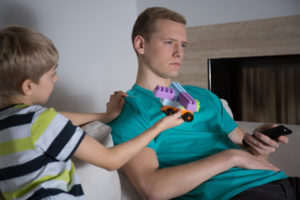 Paternal Postpartum Depression
Paternal Postpartum Depression
In the last ten years, we’ve heard more and more about postpartum depression. Celebrities like Brooke Shields, Drew Barrymore, and Gwyneth Paltrow have stepped up to speak out about their own struggles with it.
But, as much as we talk about postpartum depression in mothers, very little is mentioned about the same illness in fathers. Can men suffer postpartum depression, too?
Dads fall prey to the pain, shame, and isolation of this illness only slightly less than moms. How great it would be if some celebrity fathers would grab the mic and talk about their own depression, wouldn’t it?
As tough as it is for moms to admit they have any feelings other than the blissful joy they expected after the birth of their babies, it’s probably tougher for men. But, when you stop to think about the massive adjustments men go through with the birth of a child, it might not be so surprising.
The overwhelming sense of responsibility, sleep deprivation, difficulty in soothing a baby who continues to cry … all are familiar to  mothers, but can be just as suffocating to fathers. And as lack of sleep continues to interfere with normal functioning, shame, darkness, dread…and despair replace the joy and elation of a new baby.
mothers, but can be just as suffocating to fathers. And as lack of sleep continues to interfere with normal functioning, shame, darkness, dread…and despair replace the joy and elation of a new baby.
Can Men Suffer Postpartum Depression?
When a parent can’t feel affection, whether it’s dad or mom, that parent can be bombarded by self-critical judgment that she – or he – is a bad parent, not cut out for parenting … and with fear of ruining their child and a host of other fears.
Society has believed that postpartum depression was the result of hormonal changes in the mother after giving birth. And that since the father doesn’t give birth, he can’t possibly be afflicted with the same type of condition.
But it turns out it’s not quite that simple. About 12 percent of women experience postpartum depression after the birth of a child, and somewhere between 7-10% of men do, also. A study at the University of Southern California found that depression in men following the birth of a baby seemed to be linked to reduced testosterone levels. To make it more complicated, they found that higher testosterone levels in men seemed to protect them from depression, but sadly, it seemed to correlate to more depression in their wives.
One reason may be that testosterone gives a big boost for hunting venison and feeding the family, but is not as helpful with sensitivity to the feelings and needs of wife and children. Testosterone may even interfere with husband-wife and father-child relationships on some level.
Testosterone’s More Useful for Conquering Dragons than for Nurturing Relationships
And here’s another tidbit about these dads. One more study, published in the American Journal of Human Biology, discovered that men who have children have lower testosterone than those who don’t.
Plus, those whose testosterone dropped when the baby was born seemed to also be more tuned in to their infant’s cues, and show more affectionate attention to them… and cuddle more.
So, men whose testosterone drops when a child is born, tend to be more sensitive to their wives or partners, also. And in these close relationships, researchers found that if one spouse’s hormones drop, the other spouse’s often do, too. Researchers didn’t understand why, but speculated there was a sort of interdependence between the couple that translated into these changes.
Fathers Get Depressed, Too
So back to postpartum depression. The fact is that women aren’t the only ones who have hormonal fluctuations with pregnancy and after childbirth. For some men, being in a relationship that’s producing a child, combined with sleep deprivation, tips the scale on hormone balances, anxiety, and feeling overwhelmed.
And just like their wives sometimes do, men suffer from the negative self-talk that accompanies these negative feelings and fears. And, it’s not enough that they trudge through the exhaustion, anxieties, and overload of fatherhood. The shame is just cruel.
Shame creeps in telling them they’re not cut out to be fathers… Of course, it’s a lie. But it sounds true to their impaired thinking.
In the vast majority of cases, these guys turn out to be wonderful dads and husbands. They just need treatment and rest to restore and find the energy to care for, protect, and enjoy their families..
So… can men suffer postpartum depression…? Apparently they can.
What To Do About Paternal Postpartum Depression…?
So what can men with paternal postpartum depression do?
Seek treatment.
I’ll say it again. You can seek treatment.
The combination of the major life changes, added responsibility, money worries, and sleep deprivation create a huge obstacle to conquer by yourself.
Your manhood may tell you to not be “vulnerable.” That you must be strong and not “cave.” But, to get better, enjoy your new baby and your wife, you need a little help.
Dads aren’t likely to get better as long as they continue to rehearse their terrible self-criticisms over and over in their minds. Or ferment those thoughts through sleepless nights. But anxiety can be hard to control singlehandedly.
In many cases, an antidepressant can be very helpful, as well as talk therapy. Learning how to cut yourself some slack. Talking with your wife about how you really feel. Letting down your guard.
Still, antidepressants help only roughly two-thirds of depressed people. But if antidepressants don’t help,  don’t give up.
don’t give up.
Ketamine treatment rapidly and robustly restores you to your real self. That’s been true in 75-80% of cases, and it’s highly likely it will help you, too.
And I mean it not only helps you feel less terrible. It doesn’t just take the edge off the shame…
But rather, it helps you feel alive again. So alive you feel your love for your wife and child. You truly enjoy them again. And that helps you become the best dad and husband you you can be.
There’s no place for shame in parenting. To your child, you’re a hero. Let us help you enjoy it.
You’re going to feel good again. You’ll see.
To the strengthening of your best self,
Lori Calabrese, M.D.

Fantastic awareness and great article.